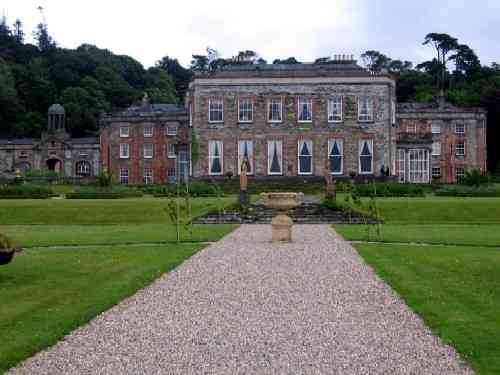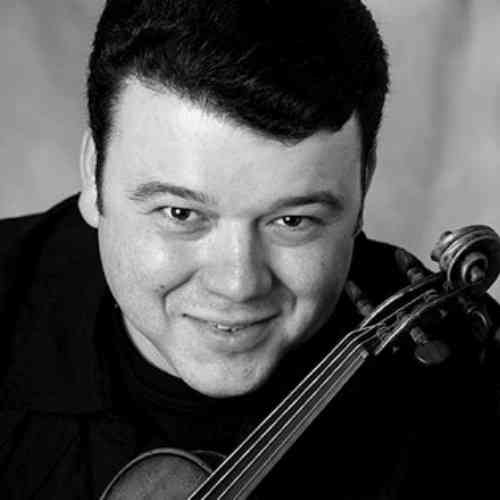
G uím rath ar lucht eagraithe na féile, ar an aos ceoil a bheidh ag glacadh páirte ann agus ar an lucht éisteachta a mbeidh d’ádh orthu a bheith i láthair. [Thank you to the organizers of the Festival, to the musicians who perform in it, and to the audience members who participate in it. (Táim cinnte gur fhág mé rud éigin tábhachtach ar lár! Taiscéalann DSM smaointe go samhlaíoch agus is féidir leis iad a úsáid le hiarmhairtí agus gníomhartha cruthaitheacha a dhéanamh; cuireann DSM a smaointe féin chun tosaigh le plé a choinneáil beo!)]”The point of music, to most people, is to ‘move’ us (the listening audience; the musicians; others)—to move us emotionally and to convey insights of value—of value to us as individuals and as a society. Performers at the West Cork Chamber Music Festival in Bantry, Ireland, are doing just that.
— Cathal Goan, RTÉ.
Particularly vivid examples were the performances by Israeli violinist Vadim Gluzman and Romanian pianist Mihaela Ursuleasa yesterday afternoon and evening.
- Ysaÿe, Sonata No. 2 in a minor, Op. 27/2
- Brahms, Sonata No. 1 in G major, Op. 78
- Brahms, Sonata No. 3 in d minor, Op. 108
Raising the emotional stakes even higher, Gluzman’s and Ursuleasa’s performances of the Brahms sonatas were, essentially, exceptionally personal answers to the question: How shall we respond to life’s challenges?
Brahms dedicated Op. 78 to Clara Schumann’s son Felix, who had died of tuberculosis in 1879. The elegiac adagio has, naturally, that conventional-minded association, with regard to Brahms’s intention, motivations, and nominal meaning. But in Gluzman’s and Ursuleasa’s hands we hear far more. The adagio becomes fervent reportage on the human condition itself, and on what is our best course of action during the short years when each of us walks the planet.
Basically, you vehemently commit yourself head-long to each other—to other humans, to significant others. Against annihilation, you counter with positive, radiant confessions; against the abyss, you hold forth with unceasing protestations of love.
Brahms’s (and Gluzman’s and Ursuleasa’s) statement is, we now see, a comprehensive treatise on virtue ethics, disguised as violin sonatas.
The solidarity of their shared vision; the rare, deep empathy between Gluzman and Ursuleasa—these are evident throughout (including the Ysaÿe and also the Schnittke Suite, which was their contribution to the evening’s main 20:00 concert). But these qualities are epitomized in their treatment of the Brahms sonatas. The vivace and presto movements, for example, are not merely ‘playing for aesthetic integrity’ but are instead ‘playing as if one’s very life depended on it.’

Gluzman’s commitment is all-consuming; the perspiration shed from his earnest brow accumulates in great pools on the stage in the Bantry House library. Ursuleasa is no less deeply invested emotionally, nor are her pyrotechnics or exertions any less prodigious than Gluzman’s.

These two achieve here a remarkable coherence—a depth and beauty so moving that many cheeks in the audience are well tear-dampened by the end of it all. One never expects this. It just happens. Reflexively, unavoidably, miraculously. And that, in a nutshell, is the whole point. What it is to be thoroughly human, revealed by music, in an early 18th-Century mansion in West Cork overlooking the sea.

The annual West Cork Chamber Music Festival was begun in Bantry in 1995, with Francis Humphrys as its Artistic Director. Bantry is an easy, scenic 90 minutes’ drive from the airport in Cork via the N71 highway along the southwest coast. Now in its 13th year, the Festival has 70-odd musicians performing more than 35 concerts over 8 days’ time. Approximately 105 works by 65 different composers from 19 countries are represented, including quite a few pieces of new music by living composers. Most of the performances are held in the spacious library of Bantry House, which holds about 190 people. Some performances occur at St. Brendan’s church in town, about a 7-minute walk from Bantry house. This year the Festival includes a composition competition for young Irish composers, and winning entries are performed by masterclass ensembles at the Festival.
The Festival continues through this weekend. Check the Festival website for more information. If you are unable to attend in person, check out RTÉ’s live and streaming broadcasts from the Festival. (I’ll post additional remarks about the West Cork Chamber Music Festival on CMT later, probably after returning home to the U.S. I wish that internet access here were cheaper and better… )
- West Cork Music Festival
- Vadim Gluzman website
- Vadim Gluzman page at Roosevelt Univ
- Mihaela Ursuleasa website
- Radio Television Éirann RTÉ
- Contemporary Music Centre Ireland
- Adams R. A Theory of Virtue: Excellence in Being for the Good. Oxford Univ, 2006.
- Foot P. Virtues and Vices: and Other Essays in Moral Philosophy. Oxford Univ, 2003.
- Godlovitch S. Musical Performance: A Philosophical Study. Routledge, 1998.
- O’Dea J. Virtue or Virtuosity?: Explorations in the Ethics of Musical Performance. Greenwood, 2000.
- Slote M. Morals from Motives. Oxford Univ, 2003.
- Statman D, ed. Virtue Ethics: A Critical Reader. Georgetown, 1997.
- Swanton C. Virtue Ethics: A Pluralistic View. Oxford Univ, 2003.
- Tymieniecka A-T, ed. Virtues and Passions in Literature: Excellence, Courage, Engagements, Wisdom, Fulfilment. Springer, 2007.
No comments:
Post a Comment